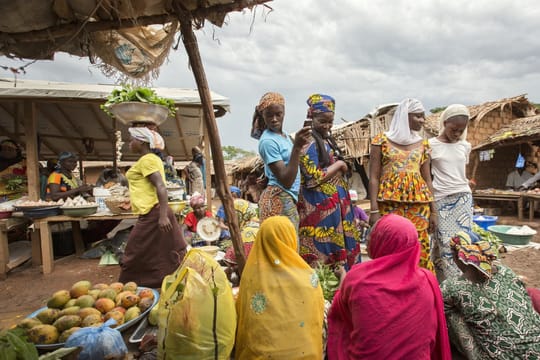The Hidden Fight for Central Africa’s Tomorrow

The Central African Republic sits at the heart of Africa — rich in gold, diamonds, forests, and quiet dreams that rarely make global headlines. It is a place people often skip on maps, dismissing it as too poor or too broken to care about. But behind the silence, families, farmers, teachers, and young people carry something bigger than the weight of poverty. They carry the hope that their land can rise if the world learns to listen — and if their own leaders learn to stand up for them first.
The world loves what lies beneath Central Africa’s soil. Hidden under rivers and forests are diamonds and gold that sparkle on faraway rings and necklaces, while the people living above often see none of the shine. Many outsiders profit — whether through old colonial networks, new private contractors, or foreign mercenaries who guard mines but leave villages scarred by violence and fear.
In the cities, life can feel stuck in the same cycle. A country rich in minerals but poor in roads. A people full of spirit but weighed down by leaders who sometimes forget what service means. While Bangui hums with traders, students, and churches on Sundays, the countryside often feels left behind schools without books, hospitals without medicine, families walking hours just to find clean water.
Yet it is too easy to call the Central African Republic just poor. That word hides what is alive here, a hidden rebellion of ordinary people who keep pushing forward anyway. Teachers who stay in empty classrooms even when salaries come late. Women who cross borders to trade vegetables and clothes to feed their families. Young people dream in French, Sango and even English about a day when their diplomas mean more than paper.
But what good is a diploma if it gathers dust on a shelf? In the Central African Republic, so many young people finish school or even university, yet there are no real jobs waiting. Our country is rich in gold and diamonds but poor in factories, offices, and local industries that could keep talent at home. A diploma should open doors here, it too often feels like paper that does nothing. Too many graduates sit at home or hustle in the markets just to eat. This is our quiet crisis an educated youth with no work to do cannot push the country forward. If we want a better tomorrow, we must build not only schools but real opportunities for the young people who are ready to work and change this land.
For too long, globalization has meant Africa exports raw wealth, diamonds, timber, minerals — while importing finished goods and old promises. The wealth that could fix roads and build schools instead feeds other economies. This is not just history — it is today. And it is why people here talk in quiet voices about wanting leaders who see the bigger picture that true independence is not flags or speeches alone, but roads that don’t wash away every rainy season, clinics that do not run out of antibiotics, schools where teachers do not have to beg for chalk.
Change does not come only from big politics. It comes from small everyday acts. In villages, people come together to fix broken wells when the government forgets. In markets, mothers teach their daughters to count coins, read receipts, and think bigger than survival. In churches and mosques, people still pray for leaders who listen to the cries of the countryside, not only the calls of foreign investors.
Yet the world has a role too. If big companies want Central Africa’s diamonds, they must also want Central Africa’s children in school. If foreign troops guard mines, they should also guard peace for villages. If globalization is real, it must mean fair trade that lifts communities up — not just deals that dig holes in the ground while leaving clinics empty.
The African Continental Free Trade Area (AfCFTA) offers a path for countries like mine to trade more with neighbors instead of begging for leftover aid. A regional market could help local farmers sell cassava and maize beyond borders, keep young traders busy with real work, and slowly break the chains of being forever stuck as just a source of raw goods.
Of course, this is not easy. Corruption, weak governance, and outside meddling still stand in the way. But the truth is simple people here do not want charity. They want partnership. They want a system that works for them, not just over them. They want roads, schools, clean water, fair wages. They want leaders who know that globalization without dignity is just another word for exploitation.
The Central African Republic is not just a forgotten place on a dusty map. It is proof that Africa’s story is bigger than diamonds and dirt roads. It is children studying under mango trees, mothers trading across borders, fathers repairing roads with their own hands. It is the quiet heartbeat of a people who refuse to give up on tomorrow waiting for a world, and leaders at home, who see them as more than a resource but as a promise.
Benicia Sephora Zouma, a student at the University of Virginia, writes to carry the hidden voice of Central Africa beyond borders telling the truth of struggle, dignity, and hope for a fairer tomorrow.